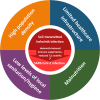Old friends meet a new foe: A potential role for immune-priming parasites in mitigating COVID-19 morbidity and mortality
- PMID: 33235797
- PMCID: PMC7665448
- DOI: 10.1093/emph/eoaa037
Old friends meet a new foe: A potential role for immune-priming parasites in mitigating COVID-19 morbidity and mortality
Abstract
The novel virus, Severe Acute Respiratory Syndrome Coronavirus 2 (SARS-CoV-2), and the associated Coronavirus Disease 2019 (COVID-19) represent a pathogen to which human beings have limited to no evolved immune response. The most severe symptoms are associated with overactive inflammatory immune responses, leading to a cytokine storm, tissue damage, and death, if not balanced and controlled. Hypotheses within Evolutionary Medicine, including the Hygiene/Old Friends Hypothesis, provide an important lens through which to understand and possibly control this overactive immune response. In this article, we explore the role that infection with soil-transmitted helminths (STHs; i.e. intestinal parasitic worms) may play in dampening SARS-CoV-2 symptoms and mitigating the worst COVID-19 outcomes. Specifically, STHs stimulate the immunosuppressive and regulatory T-helper 2 (TH2) branch of the immune system, which decreases ACE2-receptor expression (i.e. receptors SARS-CoV-2 uses to infect host cells), balances the inflammatory TH1/TH17 branches of the immune system triggered by SARS-CoV-2 infection, and reduces inflammation through the release of anti-inflammatory/regulatory cytokines. Because STHs are common and affect the most vulnerable and marginalized members of society, it is especially important to consider how these parasites may impact COVID-19 outcomes. Areas experiencing endemic STH infections are often characterized by a lack of preventative infrastructure and medical care, which may further exacerbate risk of SARS-CoV-2 infection and COVID-19 development. For this reason, we also explore biocultural factors that contribute to disease outcomes for both SARS-CoV-2 and STH infections. Biocultural and Evolutionary Medicine perspectives on COVID-19 are crucial for understanding the global impact of the disease. Lay summary: An evolutionary perspective is required to understand the global impact and various presentations of COVID-19. We consider how coinfection with soil-transmitted helminths (common parasitic worms that coevolved with humans) may suppress inflammatory immune activity, thereby potentially reducing COVID-19 disease severity. Structural and lifestyle factors shaping coinfection patterns are also discussed.
Keywords: COVID-19; Hygiene Hypothesis; Old Friends Hypothesis; biocultural perspectives; mismatch paradigm; soil-transmitted helminths.
© The Author(s) 2020. Published by Oxford University Press on behalf of the Foundation for Evolution, Medicine, and Public Health.
Figures



Similar articles
-
SARS-CoV-2 and helminth co-infections, and environmental pollution exposure: An epidemiological and immunological perspective.Environ Int. 2021 Nov;156:106695. doi: 10.1016/j.envint.2021.106695. Epub 2021 Jun 15. Environ Int. 2021. PMID: 34171587 Free PMC article. Review.
-
Immunological interactions in helminths-SARS CoV-2 coinfection: Could old enemy be a friend today?Parasite Immunol. 2023 May;45(5):e12982. doi: 10.1111/pim.12982. Epub 2023 Apr 11. Parasite Immunol. 2023. PMID: 37038955 Review.
-
Helminth infection is associated with dampened cytokine responses to viral and bacterial stimulations in Tsimane forager-horticulturalists.Evol Med Public Health. 2021 Oct 26;9(1):349-359. doi: 10.1093/emph/eoab035. eCollection 2021. Evol Med Public Health. 2021. PMID: 34868595 Free PMC article.
-
Soil-transmitted helminths: A critical review of the impact of co-infections and implications for control and elimination.PLoS Negl Trop Dis. 2023 Aug 10;17(8):e0011496. doi: 10.1371/journal.pntd.0011496. eCollection 2023 Aug. PLoS Negl Trop Dis. 2023. PMID: 37561673 Free PMC article. Review.
-
Impact of the COVID-19 Duration on Neglected Parasitic Diseases.Turkiye Parazitol Derg. 2021 Dec 2;45(4):317-325. doi: 10.4274/tpd.galenos.2021.25744. Turkiye Parazitol Derg. 2021. PMID: 34889201 English.
Cited by
-
Overlapping of Pulmonary Fibrosis of Postacute COVID-19 Syndrome and Tuberculosis in the Helminth Coinfection Setting in Sub-Saharan Africa.Trop Med Infect Dis. 2022 Jul 30;7(8):157. doi: 10.3390/tropicalmed7080157. Trop Med Infect Dis. 2022. PMID: 36006249 Free PMC article.
-
The Fight Against Severe COVID-19: Can Parasitic Worms Contribute?Front Immunol. 2022 Feb 11;13:849465. doi: 10.3389/fimmu.2022.849465. eCollection 2022. Front Immunol. 2022. PMID: 35222441 Free PMC article. No abstract available.
-
Frequency, subtypes distribution, and risk factors of Blastocystis spp. in COVID-19 patients in Tehran, capital of Iran: A case-control study.New Microbes New Infect. 2023 Jan;51:101063. doi: 10.1016/j.nmni.2022.101063. Epub 2022 Dec 9. New Microbes New Infect. 2023. PMID: 36514342 Free PMC article.
-
Epidemiological Analysis of COVID-19 Cases in Native Amazonian Communities from Peru.Epidemiologia (Basel). 2021 Oct 9;2(4):490-501. doi: 10.3390/epidemiologia2040034. Epidemiologia (Basel). 2021. PMID: 36417212 Free PMC article.
-
The impact of helminth-induced immunity on infection with bacteria or viruses.Vet Res. 2023 Oct 3;54(1):87. doi: 10.1186/s13567-023-01216-3. Vet Res. 2023. PMID: 37789420 Free PMC article. Review.
References
-
- Center for Systems Science and Engineering (CSSE) at Johns Hopkins University. COVID-19 Dashboard https://coronavirus.jhu.edu/map.html (6 September 2020, date last accessed).
-
- Jordan RE, Adab P, Cheng KK. COVID-19: risk factors for severed disease and death. Bmj 2020:368.DOI 10.1136/bmj.m1198. - PubMed
Publication types
LinkOut - more resources
Full Text Sources
Miscellaneous

